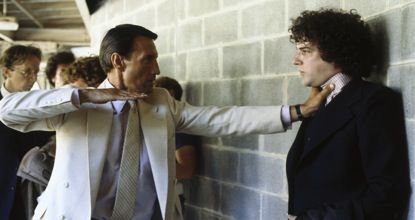
After the passing of Alfred Hitchcock numerous directors attempted to keep the director’s “vibe” alive by producing homages like Jonathan Demme’s 1979 affair LAST EMBRACE (102 mins., 1979, R; Cinematographe). This adaptation of Murray Teigh Bloom’s novel “The 13th Man” offers a laundry list of attractive ingredients – from a terrific lead performance by Roy Scheider to its outstanding supporting cast and Miklos Rozsa’s romantic, old-fashioned score – yet the movie itself doesn’t work, an unsuccessful attempt at melding the suspense of Hitch with the sensibilities of the late ‘70s.
Scheider does his best with a difficult – and not always sympathetic – role of a secret agent whose wife was killed in Mexico during a failed operation he was running. After having recuperated – to a degree – Scheider picks up his next assignment and promptly ends up doubting his sanity when he receives threats written in Hebrew. A Princeton grad student (Janet Margolin) becomes Scheider’s surprise roommate and soon offers him assistance, their trail of ancient Jewish texts and beliefs leading them ultimately to a Niagara Falls climax and effective location shooting from Demme and his long-time cinematographer Tak Fujimoto.
Despite so many elements going for it – a supporting cast which includes John Glover and Christopher Walken among them – “Last Embrace” fizzles out in its attempt to present the audience with a modern day Hitchcockian thriller. Scheider’s determined performance keeps one watching but numerous sequences are awkwardly staged and the ending a let down, with David Shaber’s script failing to get the viewer onboard Scheider’s central plight and buy into its premise. More over, the melding of Hitchcockian tenants with Rozsa’s score and a plot more “R-rated” than the type of material it’s trying to evoke results in a jarring clash of styles that fail to gel. Another issue is the female lead: Margolin is serviceable in covering the “girl next door” component of her role but is never convincing with its femme fatale angle, and I confess I laughed outloud at the end of the bedroom murder scene, where the drama fails to match the boldness of Rozsa’s score.
“Last Embrace” still has a certain quality about it that makes it compelling, mostly thanks to Scheider, who atypically emotes all over the place as the guilt-ridden secret agent, and Rozsa’s music. This is in the same vein as “Eye of the Needle” for a late career “throwback” score, and it clearly outclasses the movie it accompanies. Demme and Fujimoto’s location lensing is notable also, at least, providing another component that provides buffs with viewing interest.
Cinematographe’s 4K UHD is yet another bravura effort from the label, sporting a fresh scan of the 35mm OCN with HDR10 enhancement that increases the color and fine detail (1.85) over the prior MGM HD master Kino Lorber released on Blu-Ray a decade ago. Watching the movie’s New York locations is like taking a trip back in time, and on that end, the picture gets by, while the mono sound is decently mixed, boasting its fair share of ADR’d dialogue (note for BD owners that the accompanying Blu-Ray is based off the same 4K restoration).
An archival interview with producer Michael Taylor is interesting and carried over from the previous BD, while new extras include a commentary by Howard S. Berger and Steve Michell; a video essay by Samm Deighan; and booklet notes with essays from Jim Hemphill, Jeva Lange, and the label’s Justin LaLiberty. It’s all housed in a hardbound case limited to 6,000 copies.